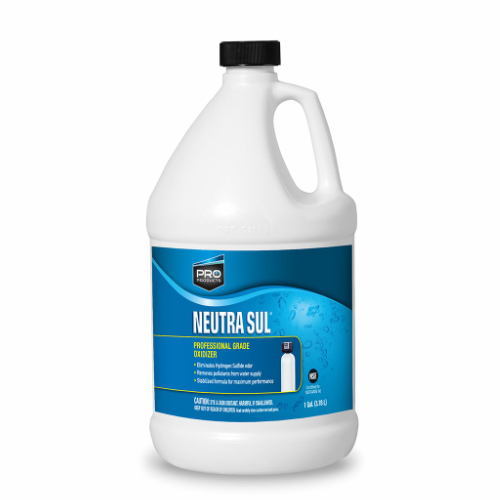| Well water users have some treatment options when it comes to severe quality issues including high iron, iron bacteria, and other difficult-to-remove contaminants. The best recommended treatment for quality issues like these is by oxidation combined with filtration, but there are a couple highly reliable oxidation methods to consider: chlorination and hydrogen peroxide. What are the pros & cons of using chlorine or hydrogen peroxide? Both have their advantages and disadvantages so you can choose the most suitable method for you! |
Chlorine Injection Advantages:
Using chlorine is affordable and readily available at most stores, including grocery and hardware stores. Chlorine can effectively oxidize very high levels of hydrogen sulfide gas odors, iron, manganese, off-color, tannins, sulfur reducing bacteria and iron bacteria. The RainDance Iron Max Plus Series with chlorine injection has been treating well water worldwide without issue! Overall, chlorine water treatment systems are ideal for homes or farms with more severe water quality problems.
Chlorine Injection Cons:
The biggest concern we hear from our customers is that they will have chlorine or chemicals still left in their water. Most of the chlorine is used up in the oxidation process, however there may be some residual chlorine left in the water. There’s no need to worry: the chlorine can be filtered out by our post de-chlorination system prior to being delivered to your tap.
Hydrogen Peroxide Injection Advantages:
Hydrogen peroxide tends to work more quickly oxidizing hydrogen sulfide and iron, so a separate contact tank is often not necessary. Furthermore, hydrogen peroxide water treatment systems don’t create an unwanted byproduct in the course of their purification process, unlike some other systems. The peroxide breaks down into particles of oxygen and water to leave your water looking great, clean, clear and smelling fresh.
Hydrogen Peroxide Injection Cons:
Unlike chlorine, 7% hydrogen peroxide is not readily available at stores and can cost 2-3 times more that chlorine. In some cases hydrogen peroxide does not perform well with severe water quality issues. For example, a customer with well water containing 13ppm total iron including iron bacteria, 0.8ppm manganese, 1ppm tannins, and some hydrogen sulfide gas used hydrogen peroxide for 6 months and never experienced totally clean, crystal clear water. We suggested a switch to chlorine and they immediately had clean, crystal clear water.
Important Notice: Chlorine and hydrogen peroxide should never be mixed. If you want to try out hydrogen peroxide treatment but find it's not for you and want to switch to chlorine treatment, thorough rising of the solution tank and injection pump can be done to ensure no residual chemical is left when you make the switch. This allows you to experiment with what works best for your unique well water chemistry.
Our injection systems can be used with both hydrogen peroxide or chlorine for the ultimate water purification system.
Using chlorine is affordable and readily available at most stores, including grocery and hardware stores. Chlorine can effectively oxidize very high levels of hydrogen sulfide gas odors, iron, manganese, off-color, tannins, sulfur reducing bacteria and iron bacteria. The RainDance Iron Max Plus Series with chlorine injection has been treating well water worldwide without issue! Overall, chlorine water treatment systems are ideal for homes or farms with more severe water quality problems.
Chlorine Injection Cons:
The biggest concern we hear from our customers is that they will have chlorine or chemicals still left in their water. Most of the chlorine is used up in the oxidation process, however there may be some residual chlorine left in the water. There’s no need to worry: the chlorine can be filtered out by our post de-chlorination system prior to being delivered to your tap.
Hydrogen Peroxide Injection Advantages:
Hydrogen peroxide tends to work more quickly oxidizing hydrogen sulfide and iron, so a separate contact tank is often not necessary. Furthermore, hydrogen peroxide water treatment systems don’t create an unwanted byproduct in the course of their purification process, unlike some other systems. The peroxide breaks down into particles of oxygen and water to leave your water looking great, clean, clear and smelling fresh.
Hydrogen Peroxide Injection Cons:
Unlike chlorine, 7% hydrogen peroxide is not readily available at stores and can cost 2-3 times more that chlorine. In some cases hydrogen peroxide does not perform well with severe water quality issues. For example, a customer with well water containing 13ppm total iron including iron bacteria, 0.8ppm manganese, 1ppm tannins, and some hydrogen sulfide gas used hydrogen peroxide for 6 months and never experienced totally clean, crystal clear water. We suggested a switch to chlorine and they immediately had clean, crystal clear water.
Important Notice: Chlorine and hydrogen peroxide should never be mixed. If you want to try out hydrogen peroxide treatment but find it's not for you and want to switch to chlorine treatment, thorough rising of the solution tank and injection pump can be done to ensure no residual chemical is left when you make the switch. This allows you to experiment with what works best for your unique well water chemistry.
Our injection systems can be used with both hydrogen peroxide or chlorine for the ultimate water purification system.



